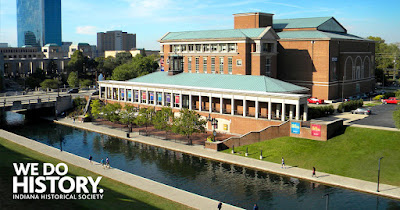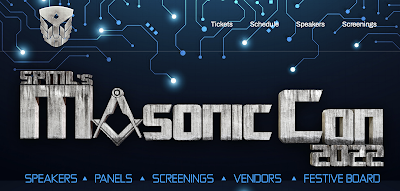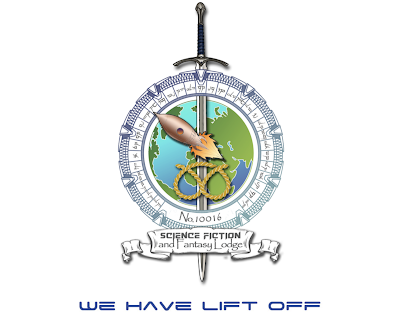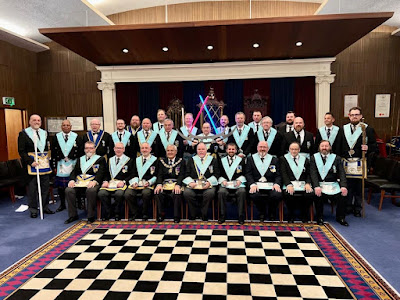by Christopher Hodapp
Issue 57 of the Journal of The Masonic Society landed in the mailbox over the July 4th weekend. The cover features a beautiful photo of the steps of Indiana’s Battleground Lodge 313 taken by Wbro. Dave Hosler. Dave continues to make stunning photos of Masonic subjects, along with being an indefatigable Mason who seems to turn up everywhere, and we're lucky to have him here in Indiana.
Editor Michael Poll has once again assembled a fine lineup of articles this issue:
• The Lively Career of Brother William Robinson: a.k.a. Chung Ling Soo by Triston Wilkinson
• A Qabalistic Interpretation of Freemasonry by Rodney McGillvary
• A Treasure Hunt in the Archives of Lodge 43 by Nathaniel Gilchrist
• One and Twenty by M.C. Lee
• On the Esoteric Masonic Nature of Psalm 127

But the one article I especially want to point out in this issue is Freemasonry Struggles for Relevance in the Modern World it Helped Create by Wes Regan, Worshipful Master of Vancouver Lodge of Education and Research. The piece is subtitled ‘A Response to Professor John Dickie.’ WB Regan is a Canadian Mason in the Grand Lodge F&AM of British Columbia and Yukon. The article he has written for the Journal is one of the most thought provoking pieces about the future of the fraternity I’ve read since Angel Millar’s article in The Plumbline last year, entitled The Future of Freemasonry and What We Have To Offer. Unlike the doomers and gloomies who continue to predict the end of Freemasonry as we know it within the next two decades, Regan presents a completely different alternative.

Last year, Professor John Dickie published
The Craft: How the Freemasons Made the Modern World. Although not a Mason himself, he presents the history and influence of our fraternity partially by examining the roles of noteworthy Masons and the fraternity itself at major turning points in world events. If you haven’t read it, you’ll find that it’s a pretty evenhanded treatment of Freemasonry and a somewhat unique way to explore the role our fraternity has played at major turning points in history.
Dickie spoke last December at the
Vancouver Lodge of Education and Research, and during the Q&A period, he opined that Freemasonry needs to reconsider its real and perceived secrecy, its relationship with religion, and its continued exclusion of women. He warned that ignoring these issues will adversely affect our sustainability in the coming years. It is these remarks that Brother Regan addresses in his article.
Recent Pew polls have shown that North American men have been drifting away from the sort of organized, mainstream faith traditions of the mainline churches that their families followed for decades or even centuries. Over the last 15 years, religiously unaffiliated Americans have been steadily growing in number, and currently make up almost one third of the population. (See chart above.)
When such men knock at the door of the lodge, they more and more frequently answer the question concerning a belief in God by saying “I’m spiritual, not religious.” One of Wes’ main points is that the esoteric-minded, observant-styled lodges are exactly the sorts of organizations such men are attracted to, in part to perhaps explore different notions of spirituality and discover their own paths by having such discussions with other Masons without fear of censure or ridicule...
And what’s wrong with that?
Freemasonry as a fraternal organization has been elastic enough to adapt itself to vastly different societies all around the world for more than three centuries. And a quick glance at a list of the swollen number of appendant groups that require Masonic membership as a prerequisite (Royal Arch, Knights Templar, Scottish Rite, Shriners, Grotto, DeMolay, Rainbow, Job’s Daughters, Eastern Star, Amaranth, Allied Masonic Degrees, High Twelve, National Sojourners, Widow’s Sons, ad infinitum) clearly shows that Freemasonry has the ability to provide comfortable niches for an enormous variety of individual interests.
Central to Regan’s piece are the writings of the late Tom Jackson, Past Grand Secretary of Pennsylvania, who spent the overwhelming majority of his long Masonic career urging the fraternity to actively seek out better leaders, embrace Masonic scholarship (while rejecting sensationalistic fairy tales and conspiracies), and most important, return to our longstanding demands for better standards of conduct, work and achievement that used to demonstrate that the Masons really were worthy of being known as the movers and shakers in their communities.
In the scores of book reviews Tom Jackson wrote for the Scottish Rite NMJ magazine, The Northern Light, he was always in search of books that that treated Freemasonry (whether written by and for Masons, or not) authentically, that were neither too boastful of Masonry’s accomplishments and position in the past, nor too phantasmagorical about its allegedly secret , magical, mystical powers. Books and TV shows that exaggerate everything about Masonry wind up influencing men to join in search of these things, only to walk away when they don’t find it in reality in the lodge. Ultimately, the conclusion WB Regan comes to is that to thrive in 21st century society, it’s long past time we stop pretending that Freemasonry is monolithic worldwide (or nationwide, or even statewide), and to embrace the wide variety of lodges and their individual cultures and interests that have been developing. Just as it did in the late 1700s in England, we have room for both the knife & fork (or ‘leg o’ mutton’) lodges that love the pancake breakfasts, the chili and bean suppers, family nights, golf tournaments, Hawaiian shirt nights, etc, as well as the ‘blue stocking’ (tuxedo) lodges that explore the esoteric side of Masonic philosophy, concentrate on Masonic and philosophical scholarship, or who delight in the old fashioned customs of the formal festive boards. I obviously can’t do justice to his piece here, and for the time being, it’s only available to members of the Masonic Society in its Journal. If you aren’t a member or subscriber, visit masonicsociety.com . - US Membership is US$45.00/yr
- Canadian Membership (Canadian mailing addresses): US$49.00/yr
- Overseas Membership (non-US/Canada): US$67.00/yr.
- Lodges, libraries and institutions, as well as Masons unrecognized by COGMMNA lodges may subscribe to the magazine alone for the same price.



















